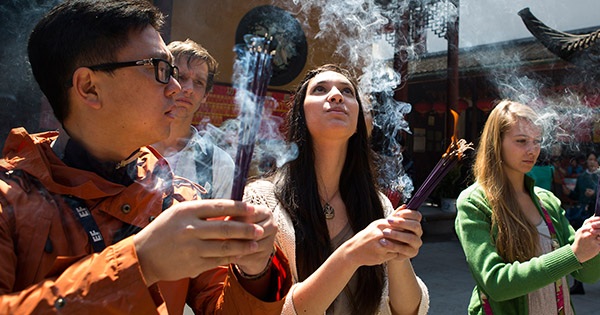Fernando M. Reimers is the Ford Foundation Professor of International Education at the Harvard Graduate School of Education. We first spoke with Professor Reimers when he gave the keynote address last fall at the New England Global Education Symposium at EF Center in Boston. Following his speech we sat down with him to further discuss global travel and the impact it can have on an individual’s happiness.
As an experiential learning company, Professor Reimer’s work linking education, travel and happiness resonated deeply with us. His theory is about more than smiling faces and travel photos, though. It’s about rethinking the definition of the classroom, and turning even the most short-term travel experiences into life-shaping learning moments.
Democracy, Education, and the “Pursuit of Happiness”
As Reimers explains, the idea of “happiness” is a relatively modern concept that arose during the Enlightenment – the 18th century thought movement that gave rise to such ideas as modern democracy, individual liberty, and the United States of America. One of the revolutionary ideas of the Enlightenment, and democracy itself, was the idea that average citizens could and should influence their government. This, in turn, gave rise to the concept of public education to help ensure that each citizen was equipped to make those decisions for their communities. If we think of happiness as someone’s expectations versus their reality, then “happiness” becomes defined as the expectation of a democratic citizen: one who is able to understand the context of their community and guide it forward.

In our age of information and technology, the structure of education has fundamentally changed. Students no longer need to go to school to get information – most can answer any trivia question in less than a minute by using their phone. Reimers argues that if education’s purpose is to prepare well-informed and effective citizens, then it’s important that the emphasis of education shift towards fostering learning mindsets that help students process and sort this unlimited access to information. This theme is echoed across most educational “hot topics” nowadays (21st century skills, anyone?), but Reimers emphasizes that global experiences should shape this educational landscape as well.
Education & Travel in the Modern World
You’ve probably seen a few of the recent presidential debates, and may have noticed how the debate topics oscillate between local and global issues. Tax reform – local. Refugee issues – global. Immigration policy – a little bit of both.
For Professor Reimers, this mixing of international and local issues in our political debates reflects a larger change in the issues addressing our world and government. Put simply, the divide between local and global has blurred. And, in our democratic society, this change in government policy therefore calls for an education that helps students better maneuver both local AND global issues, which are increasingly considered alongside one another.
Reimers believes that in this information-heavy, globalized world, one of the most important tools to arm our students with are mindsets – for instance, religious literacy or cosmopolitanism – that can help students learn to negotiate these new waters.
Tips for Effective Travel
While study abroad and long-term travel agendas undoubtedly lend themselves to increased global awareness, short-term travel can be a way to leverage and strengthen in-class academic study, as well.

1. Integrate the trip with preexisting curriculum
Reimers’ number one tip for effective travel is to integrate the trip’s itinerary with as many at-school courses as you can. Have teachers work together with their Tour Consultant to link their curriculum to their trip itinerary, to leverage both the in-class activities and the trip. Ideally, the trip would pull in elements from multiple courses – a trip to Florence and Pisa would relate to the Italian Language curriculum, of course, but could also tie into Math and Physics by looking at the shape of the Duomo or the slow sinking of the Leaning Tower, or Economics when considering the Medici’s role in developing a modern banking system.
This will take cross-departmental coordination, but a trip that is well integrated will not only improve the overall experience, it will also make concepts in the classroom “stickier,” and therefore more likely to latch on to the students’ memory.
2.Set intentional learning goals before, during and after travel
Due to the time constraints of short term international travel, impact level is often as much a result of planning as it is a result of the itinerary. Reimers recommends that the team of teachers planning a trip should choose specific themes or mindsets to focus on to keep students engaged before and during the tour, and encourage them to reflect on their experiences upon returning home. These goals and discussions should also include student input – after all, what would make a student feel more effective (and therefore happy) than being able to contribute to their own learning objectives? Teachers can set an overarching theme, and have students pick individual points of focus for the tour, or pick a couple themes, and have students discuss which would be most important for them to explore. Personalized learning platforms, like EF’s weShare help facilitate and bring to life this exact type of learning.
3. Establish an environment and set time for student reflection and engagement
Just like in the classroom, differentiated teaching on the road can be difficult. Even once you’ve integrated elements of your curriculum, set intentional learning goals and departed, you’ll most likely still have a wide range of student readiness in your group. To help meet each student where they are, Reimers encourages setting aside time for students to reflect on their goals and personal progress individually, and to encourage situations where the group shares ideas and reflections together. This will allow students to track their own progress through self-reflection, increasing their receptiveness to the ideas learned on the tour as a whole.
Planning cross-departmental travel that is integrated into the school’s larger curriculum goals and student interests will certainly require some planning, but if the reward is a group of transformed, globally-minded students who gain a better shot at pursuing their own happiness and changing the world, it’s more than worth it!
Chat with one of EF’s Tour Consultants and learn more about educational travel and inspiring your students outside of the classroom.
Click here for more on Professor Reimers’ work. For a longer essay on the role of the Enlightenment, public education and the promotion of tolerance, see his chapter Making Democracy Work: A Civic Lesson for the Twenty First Century
For an example of how travel can help education leaders draw valuable insights to address adaptive education challenges, see the book Fifteen Lessons on Education in Singapore edited by Professor Reimers and his student Nell O’Donnell, based on a study tour of Singapore which was organized by EF Education First.
Related articles
